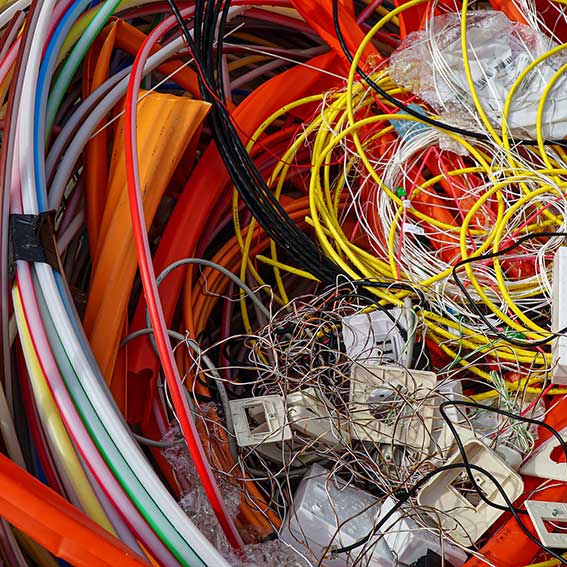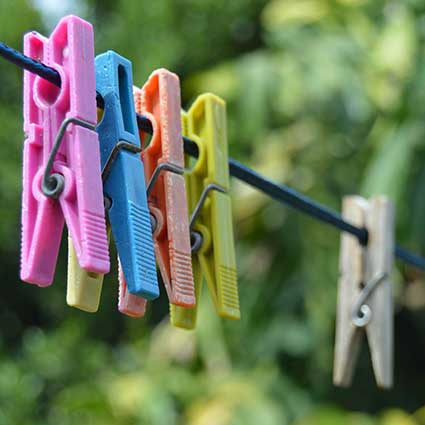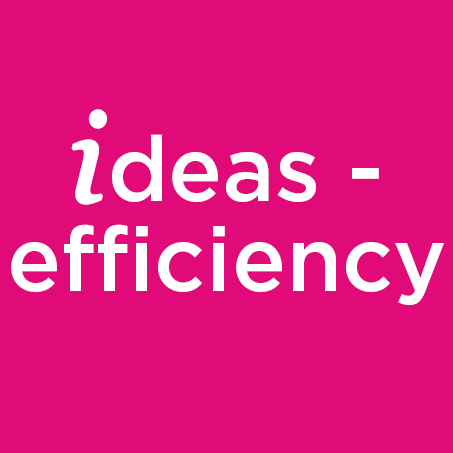


Our current economy is linear, in which we take from nature, make, use and mainly dispose of products. This is no longer sustainable and we are creating large amounts of ‘waste’. There is no such thing as ‘throwing away’: it all goes somewhere.
The more careful we are about the materials and products we consume and use the less natural resources are depleted and the less waste we produce.
The circular economy is about getting the most out of our resources and considering the whole lifecycle of a product or building from the outset, having products that are more durable, are easy to disassemble and reuse or recycle at the end of life. Alternative business models such as leasing and sharing also ensure that products are used to their maximum potential and kept in circulation longer.




From low cost to more expensive items, many are made of materials that can't be repaired or recycled, or just break too easily. Very simply, think about those pegs. Plastic ones degrade and break up to small pieces. Wooden ones will last longer and the wood is biodegradable. (You can buy them locally too - from Mike's hardware store in Wincanton!). This can apply to many things we buy - just think about the materials they are made from and whether they can be recycled, or reused. Plastic coat-hangers break before the wire ones. Look at the packaging too.

What are you clothes made of? Synthetic or natural fibres?
Washing synthetic garments can release between 500,000 – 6,000,000 microfibres per wash which will end up in our water supplies, our rivers and the sea. Microfibres have been found in marine animals which harms them and also means that we can ingest microfibres if we eat seafood.
How can we reduce the numbers of microfibres shed in our clothes wash?

The ‘Right to Repair Law’ came into being on 8 July 2021. Manufacturers will now have to make spare parts available for washing machines, dishwashers, refrigerators and TVs for the first time. Repairs also need to be possible using everyday tools. However, manufacturers do have a two year window to make the necessary changes and it covers some electronic devices but not smartphones or laptops. Neither does it cover cookers, hobs, tumble dryers or microwaves
Read more at the Which website
UCL’s ‘The Big Repair Project’ is looking at the maintenance and repair of home appliances. Taking part in their survey will help to further develop the new 'Right to Repair' policy. There's also the option of taking part in a long term study about repairs you carry out at home. To find out more go to the Big Repair Project website
General information on how to repair products is available online from organisations like UK Whitegoods and iFixit.
Repair What You Wear – website showing videos of how to repair all sorts of clothing from jeans to knitwear, socks to uniforms.
Here are some of the local repair services:
Alex Appleton (ring resizing, stone setting, stringing etc)
Andy’s Appliance Repair (ex Jerry’s Electrical) 07484 861797
Ian Durant (watch repairs) Bayford Tel 01963 34634
P C Wincanton (computers)
PRM Domestics (domestic appliances) 07977 802756
Purple Hire Solutions (electric hand tools eg drills - petrol engines eg hedgecutters, lawnmowers - small petrol generators) Tel 01963 33999
Rule #65 (bike repairs) Tel 01963 846221 >
Willow basket repairs – call/text Lydia on 07415 149597 or drop off at Wincanton Fruit & Veg.
Wincanton Cobbler (shoes and bag repairs)
Young’s Garden Machinery (petrol or electric lawnmowers etc) 07966 715207 or 07895 018520
One Planet Wincanton runs a monthly Repair Café to which you can bring all manner of goods to be repaired by volunteer repairers. Go to the News page of this website for information on the next Café.

Many appliances now have to state how energy efficient they are so it is easy to see.
Further information on the most energy-efficent products on the UK market is available at Top 10 Energy Efficiency Guide

Do you need to update your phone? Smart phones with built in obsolescence has become a major problem, not only for the waste of materials but also because of their hunger for the rare earth elements used to make them. Overall, a smartphone handset consists of around 40% metals (predominantly copper, gold, platinum, silver and tungsten), 40% plastics, and 20% ceramics and trace materials. They also contain rarer metals, some of which are mined in poor human conditions and by processes that cause heavy pollution.
Read more -
Our smartphone addiction is costing the Earth - By David Nield August 04, 2015
The Environmental Impact of Your Smartphone (including iPhone lifecycle carbon footprint) 6 November 2018
Fairphone 3 – the most ethical and repairable phone you can buy
What if you could buy a phone that will last five years, can be easily repaired and is made as ethically as possible? That’s the aim of the latest Fairphone 3 – and on many counts it succeeds.